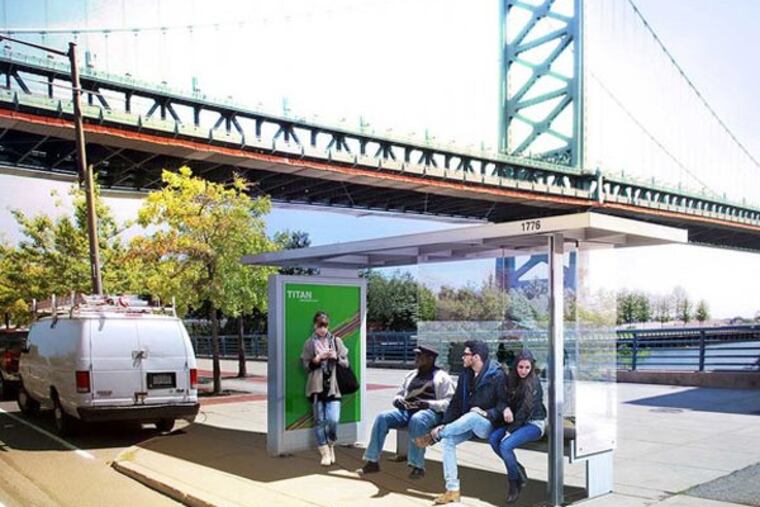Proposal for advertising on city bus shelters advances
Bus riders and others could see 600 new shelters throughout Philadelphia, along with dozens of new newsstands and kiosks promoting the city's arts and culture scene, if City Council approves a 20-year advertising contract.

Bus riders and others could see 600 new shelters throughout Philadelphia, along with dozens of new newsstands and kiosks promoting the city's arts and culture scene, if City Council approves a 20-year advertising contract.
A deal with New York-based Titan Outdoor L.L.C. would give the company the right to design, install, maintain, and sell advertising on the 600 shelters - replacing the city's current stock 318 and adding 282 - and dozens of newsstands, cultural information kiosks, and benches.
The advertising is expected to generate about $100 million for the city. The contract would guarantee at least $52 million and assumes that the city would receive an additional $47 million in advertising revenue based on a formula that would give it up to 27 percent of the total advertising proceeds.
"This contract affords the city the opportunity to replace decrepit transit shelters with world-class amenities designed right here in Philadelphia," said Andrew Stober, chief of staff in the mayor's Office of Transportation and Utilities, at a Council committee hearing.
The proposed agreement drew criticism from some residents and members of the arts community who said it did not specify where the art information kiosks would go and did not include plans to provide real-time information.
Despite those concerns, the committee agreed that the measure should go before the full Council for a final vote, which could happen as early as next Thursday.
Charles Goodwin, vice president of the Center City Residents Association, said his group was concerned that the bus shelters are not being designed for the 21st century.
"The bus shelters we are getting under this deal seem to be very much 1990s bus shelters," Goodwin said. "Within five years, we should have real-time information in all the bus kiosks. . . . We can't be in 2035 with bus shelters that don't provide that. We will be the only city that doesn't."
Stober, who has been working on the competitively bid contract on behalf of the administration, said the city would need to work with SEPTA to get real-time data.
"It's a coordination issue, and it's also a data issue," Stober said. "We wanted to make sure we were focusing on providing the most shelters that we could to neighborhoods across the city."
SEPTA has a contract with Titan for advertising on buses and trains and at stations. It gets 62.5 percent of the advertising money under that deal; Titan gets the rest.
Titan, which bested CBS Outdoor in the bidding for the proposed contract, would give the city from 17 percent to 27 percent of ad revenue. Scott Goldsmith, executive vice president of Titan, said that was a different business model from the contract with SEPTA.
The proposed contract "is a good deal for the city," he said. The city would be guaranteed at least $2.6 million annually, no matter how many ads are sold.
The city also could let Titan to offer digital advertising on 100 bus shelters, which could generate an additional $13 million over the 20 years.
The new bus shelters would be steel with glass panels. They would be noncorrosive and graffiti-resistant, Goldsmith said. Titan hired DIGSAU, a Philadelphia design firm, to create the new look.
"It's modern but not too modern. Beautiful but not too large," Goldsmith said, adding that the design must still be approved by the Art Commission.